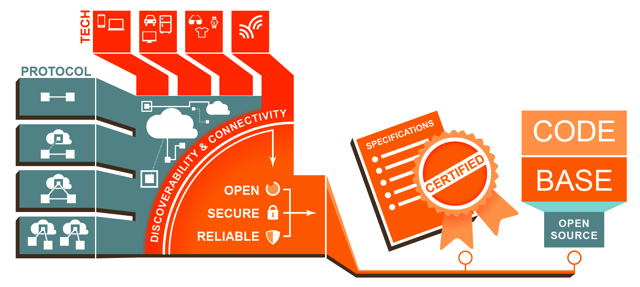Last week, we reported that Microsoft was joining Qualcomm and 50 other members of the AllSeen Alliance, in an effort to develop open source standards for the Internet of Things. Yesterday, a group of tech companies led by Intel announced the formation of a competing organization. The Open Interconnect Consortium — which also includes Atmel, Broadcom, Dell and Samsung — similarly plans to develop standards for wirelessly connecting devices to each other and the Internet.
Member companies of both organizations plan to offer up intellectual property for others to work on and use. Apple and Google are among additional companies that may also create their own standards for the Internet of Things (IoT).
“Member companies will contribute software and engineering resources to the development of a protocol specification, open source implementation, and a certification program, all with a view of accelerating the development of the IoT,” the press release states. “The OIC specification will encompass a range of connectivity solutions, utilizing existing and emerging wireless standards and will be designed to be compatible with a variety of operating systems.”
According to Imad Sousou, GM of Intel’s open-source technology center, products using the Open Interconnect standard should be available by 2015.
“The reason for all this activity is sheer numbers, and potentially a lot of market power,” explains The New York Times. “The IoT is expected to eventually touch some 200 billion cars, appliances, machinery and devices globally, handling things like remote operation, monitoring and interaction among Internet-connected products. So far, such connections are at best uneven, but workable uniform standards could help that get better.”
Unnamed sources have suggested that one of the main reasons there are multiple groups pursuing open source standards has to do with a lack of trust regarding certain companies parting with intellectual property. Some are concerned that technology revealed during this initial process can be beneficial to certain players in the future.
“It’s likely that the communications standards governing these things will also affect the means for collecting data about the behavior of both devices and the people that use them,” notes the article. “That makes it a very important future subset of the Internet, since data like that will inform things like future product development and what ads individual consumers are shown.”
Related News:
IoT: Microsoft Joins the Qualcomm-Backed AllSeen Alliance, ETCentric, 7/3/14


No Comments Yet
You can be the first to comment!
Sorry, comments for this entry are closed at this time.